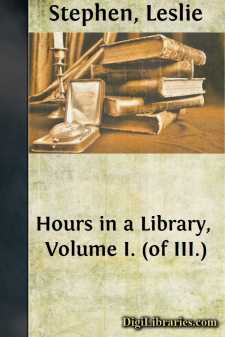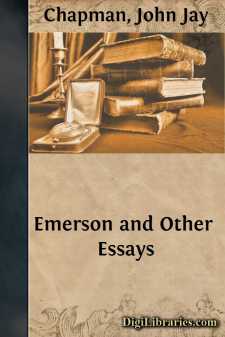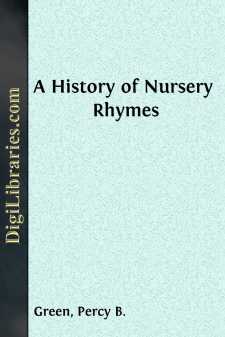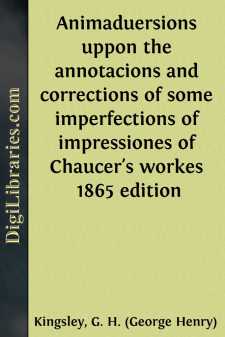Literary Criticism
- American 18
- Ancient and Classical 3
- Asian 1
- Australian & Oceanian 1
- Books & Reading 8
- Caribbean & Latin American 2
- Drama 2
- English, Irish, Scottish, Welsh 49
- European 7
- General 37
- Horror 1
- Humor 2
- Jewish 2
- Medieval 2
- Middle Eastern 3
- Poetry 7
- Renaissance 6
- Russian & Former Soviet Union 1
- Shakespeare 27
Literary Criticism Books
Sort by:
by:
Leslie Stephen
OPINIONS OF AUTHORS Libraries are as the shrines where all the relics of the ancient saints, full of true virtue, and that without delusion or imposture, are preserved and reposed.—Bacon, Advancement of Learning. We visit at the shrine, drink in some measure of the inspiration, and cannot easily breathe in other air less pure, accustomed to immortal fruits.—Hazlitt's Plain Speaker. What a...
more...
CHAPTER I. Burlesque—Parody—The "Splendid Shilling"—Prior—Pope—Ambrose Philips—Parodies of Gray's Elegy—Gay. Burlesque, that is comic imitation, comprises parody and caricature. The latter is a valuable addition to humorous narrative, as we see in the sketches of Gillray, Cruikshank and others. By itself it is not sufficiently suggestive and affords no story or conversation....
more...
by:
Arnold Bennett
WILFRED WHITTEN'S PROSE 4 Apr. '08 An important book on an important town is to be issued by Messrs. Methuen. The town is London, and the author Mr. Wilfred Whitten, known to journalism as John o' London. Considering that he comes from Newcastle-on-Tyne (or thereabouts), his pseudonym seems to stretch a point. However, Mr. Whitten is now acknowledged as one of the foremost experts in...
more...
by:
Walter Crane
WALTER CRANE 1893 See handwritten text Mr Dallas's reproductions of my pen drawings for this work appear to me to be very faithful & successful in preserving the touch & general character of the originals. I have to certify that I have printed 650 copies of each of these eight subjects designed by Walter Crane, and engraved in Dallastype Facsimile by myself. Six Hundred Copies are for...
more...
by:
Edmund Gosse
PREFACE: ON FLUCTUATIONS OF TASTE When Voltaire sat down to write a book on Epic Poetry, he dedicated his first chapter to "Differences of Taste in Nations." A critic of to-day might well find it necessary, on the threshold of a general inquiry, to expatiate on "Differences of Taste in Generations." Changes of standard in the arts are always taking place, but it is only with advancing...
more...
by:
John Jay Chapman
EMERSON I "Leave this hypocritical prating about the masses. Masses are rude, lame, unmade, pernicious in their demands and influence, and need not to be flattered, but to be schooled. I wish not to concede anything to them, but to tame, drill, divide, and break them up, and draw individuals out of them. The worst of charity is that the lives you are asked to preserve are not worth preserving....
more...
by:
Percy B. Green
CHAPTER I. "The scene was savage, but the scene was new." Scientists tell us many marvellous tales, none the less true because marvellous, about the prehistoric past. Like the owl in the preface, they are not discouraged because the starting-point is beyond reach; and we, like the cat, should try to awaken our interest when evidences are presented to us that on first hearing sound like the...
more...
by:
Charles Kent
PREFACE. As the title-page of this volume indicates, no more is here attempted than a memorial of Charles Dickens in association with his Readings. It appeared desirable that something in the shape of an accurate record should be made of an episode in many respects so remarkable in the career of the most popular author of his generation. A commemorative volume, precisely of this character, was...
more...
by:
Bliss Perry
I Race, Nation, and Book Many years ago, as a student in a foreign university, I remember attacking, with the complacency of youth, a German history of the English drama, in six volumes. I lost courage long before the author reached the age of Elizabeth, but I still recall the subject of the opening chapter: it was devoted to the physical geography of Great Britain. Writing, as the good German...
more...
PREFACE. Although only the grandson of the first of his name, the author of the following interesting specimen of 16th-century criticism came of a family of great antiquity, of so great an antiquity, indeed, as to preclude our tracing it back to its origin. This family was originally known as the “De Botfelds,” but in the 15th century one branch adopted the more humble name of “Thynne,” or...
more...











